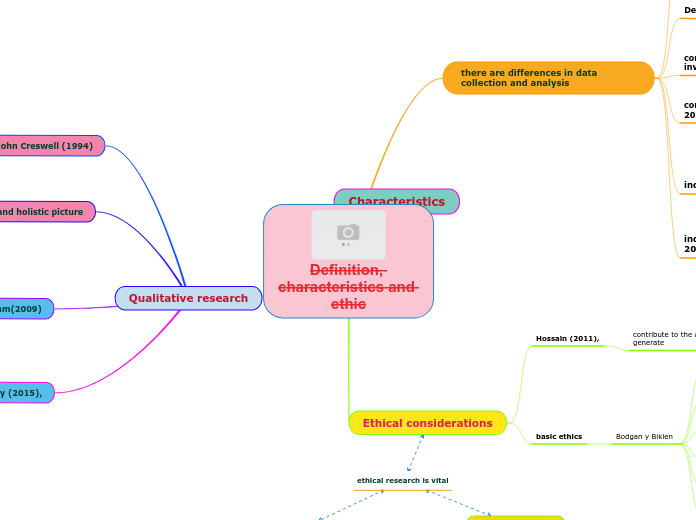
Definition, characteristics and ethic
there are differences in data collection and analysis
Naturalist(Bogdan y Biklen, 2007)
non-experimental approach in which subjects are studied in their natural environment.
open observation
covert observation
Grady, Ale y Morris (2012)
evaluate the impact of parents' departure during school adaptation
Descriptive data (Routledge, 2012)
take the form of words or pictures instead of numbers
consider details
quotes to accurately narrate
comprehensive narrative investigations (Sandelowski (2000))
produce findings closer to the data.
concern for the process (Armfield, 2007)
focuses on process rather than results
focus group
depth interview
participant observation
decisive importance
inductive
concepts are built on the basis of data collection
understand situations
focus behaviors
build theories
conclusions
inductive approach (ResearchGate, 2019)
assumptions of their lives
Ethical considerations
Hossain (2011),
contribute to the analysis of the data they generate
basic ethics
Bodgan y Biklen
Honor the privacy of the participants.
Consider the difference in time commitment of the participants
Protect the identity of the participants to avoid embarrassment or harm.
Treat participants with respect and seek their cooperation in the investigation.
Negotiate with the participants the terms of the agreement to conduct a study.
Tell the truth when writing and reporting your findings
Qualitative research
John Creswell (1994)
process of inquiry of understanding that draws on different methodological traditions of inquiry to explore a social or human problem
build a complex and holistic picture
analyze words
detailed views
I study in a natural environment.
Sharan B. Merriam(2009)
people give meaning and experience to the world
Dra. Leslie Curry (2015),
strategy to collect
organize and generate knowledge
phenomena difficult to measure
